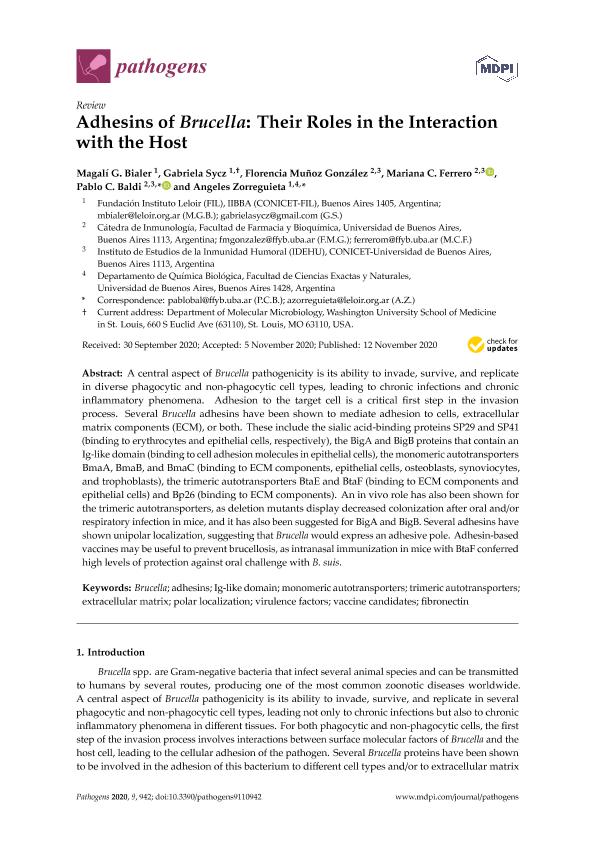Artículo
Adhesins of Brucella: Their Roles in the Interaction with the Host
Bialer, Magali Graciela ; Sycz, Gabriela
; Sycz, Gabriela ; Muñoz González, Florencia
; Muñoz González, Florencia ; Ferrero, Mariana Cristina
; Ferrero, Mariana Cristina ; Baldi, Pablo Cesar
; Baldi, Pablo Cesar ; Zorreguieta, Ángeles
; Zorreguieta, Ángeles
 ; Sycz, Gabriela
; Sycz, Gabriela ; Muñoz González, Florencia
; Muñoz González, Florencia ; Ferrero, Mariana Cristina
; Ferrero, Mariana Cristina ; Baldi, Pablo Cesar
; Baldi, Pablo Cesar ; Zorreguieta, Ángeles
; Zorreguieta, Ángeles
Fecha de publicación:
11/2020
Editorial:
Molecular Diversity Preservation International
Revista:
Pathogens
ISSN:
2076-0817
Idioma:
Inglés
Tipo de recurso:
Artículo publicado
Clasificación temática:
Resumen
A central aspect of Brucella pathogenicity is its ability to invade, survive, and replicate in diverse phagocytic and non-phagocytic cell types, leading to chronic infections and chronic inflammatory phenomena. Adhesion to the target cell is a critical first step in the invasion process. Several Brucella adhesins have been shown to mediate adhesion to cells, extracellular matrix components (ECM), or both. These include the sialic acid-binding proteins SP29 and SP41 (binding to erythrocytes and epithelial cells, respectively), the BigA and BigB proteins that contain an Ig-like domain (binding to cell adhesion molecules in epithelial cells), the monomeric autotransporters BmaA, BmaB, and BmaC (binding to ECM components, epithelial cells, osteoblasts, synoviocytes, and trophoblasts), the trimeric autotransporters BtaE and BtaF (binding to ECM components and epithelial cells) and Bp26 (binding to ECM components). An in vivo role has also been shown for the trimeric autotransporters, as deletion mutants display decreased colonization after oral and/or respiratory infection in mice, and it has also been suggested for BigA and BigB. Several adhesins have shown unipolar localization, suggesting that Brucella would express an adhesive pole. Adhesin-based vaccines may be useful to prevent brucellosis, as intranasal immunization in mice with BtaF conferred high levels of protection against oral challenge with B. suis.
Archivos asociados
Licencia
Identificadores
Colecciones
Articulos(IDEHU)
Articulos de INST.DE EST.DE LA INMUNIDAD HUMORAL PROF.R.A.MARGNI
Articulos de INST.DE EST.DE LA INMUNIDAD HUMORAL PROF.R.A.MARGNI
Articulos(IIBBA)
Articulos de INST.DE INVEST.BIOQUIMICAS DE BS.AS(I)
Articulos de INST.DE INVEST.BIOQUIMICAS DE BS.AS(I)
Citación
Bialer, Magali Graciela; Sycz, Gabriela; Muñoz González, Florencia; Ferrero, Mariana Cristina; Baldi, Pablo Cesar; et al.; Adhesins of Brucella: Their Roles in the Interaction with the Host; Molecular Diversity Preservation International; Pathogens; 9; 11; 11-2020; 1-20
Compartir
Altmétricas



